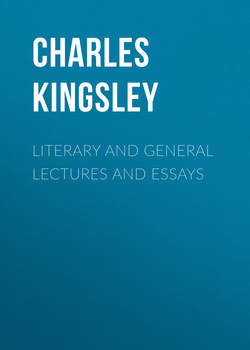Literary and General Lectures and Essays

Реклама. ООО «ЛитРес», ИНН: 7719571260.
Оглавление
Charles Kingsley. Literary and General Lectures and Essays
THE STAGE AS IT WAS ONCE1
THOUGHTS ON SHELLEY AND BYRON2
ALEXANDER SMITH AND ALEXANDER POPE
TENNYSON4
BURNS AND HIS SCHOOL5
THE POETRY OF SACRED AND LEGENDARY ART6
ON ENGLISH COMPOSITION
ON ENGLISH LITERATURE
GROTS AND GROVES9
HOURS WITH THE MYSTICS11
FREDERICK DENISON MAURICE.13 IN MEMORIAM
Отрывок из книги
The poets, who forty years ago proclaimed their intention of working a revolution in English literature, and who have succeeded in their purpose, recommended especially a more simple and truthful view of nature. The established canons of poetry were to be discarded as artificial; as to the matter, the poet was to represent mere nature as he saw her; as to form, he was to be his own law. Freedom and nature were to be his watchwords.
No theory could be more in harmony with the spirit of the age, and the impulse which had been given to it by the burning words of Jean Jacques Rousseau. The school which arose expressed fairly the unrest and unruliness of the time, its weariness of artificial restraint and unmeaning laws, its craving after a nobler and a more earnest life, its sense of a glory and mystery in the physical universe, hidden from the poets of the two preceding centuries, and now revealed by science. So far all was hopeful. But it soon became apparent, that each poet’s practical success in carrying out the theory was, paradoxically enough, in inverse proportion to his belief in it; that those who like Wordsworth, Southey, and Keats, talked most about naturalness and freedom, and most openly reprobated the school of Pope, were, after all, least natural and least free; that the balance of those excellences inclined much more to those who, like Campbell, Rogers, Crabbe, and Moore, troubled their heads with no theories, but followed the best old models which they knew; and that the rightful sovereign of the new Parnassus, Lord Byron, protested against the new movement, while he followed it; upheld to the last the models which it was the fashion to decry, confessed to the last, in poetry as in morals, “Video meliora proboque, deteriora sequor,” and uttered again and again prophecies of the downfall of English poetry and English taste, which seem to be on the eve of realisation.
.....
We would that it were only for this count that Byron has had to make way for Shelley. There is, as we said before, a deeper moral difference between the men, which makes the weaker, rather than the stronger, find favour in young men’s eyes. For Byron has the most intense and awful sense of moral law—of law external to himself. Shelley has little or none; less, perhaps, than any known writer who has ever meddled with moral questions. Byron’s cry is, I am miserable because law exists; and I have broken it, broken it so habitually, that now I cannot help breaking it. I have tried to eradicate the sense of it by speculation, by action; but I cannot—
There is a moral law independent of us, and yet the very marrow of our life, which punishes and rewards us by no arbitrary external penalties, but by our own consciousness of being what we are:
.....